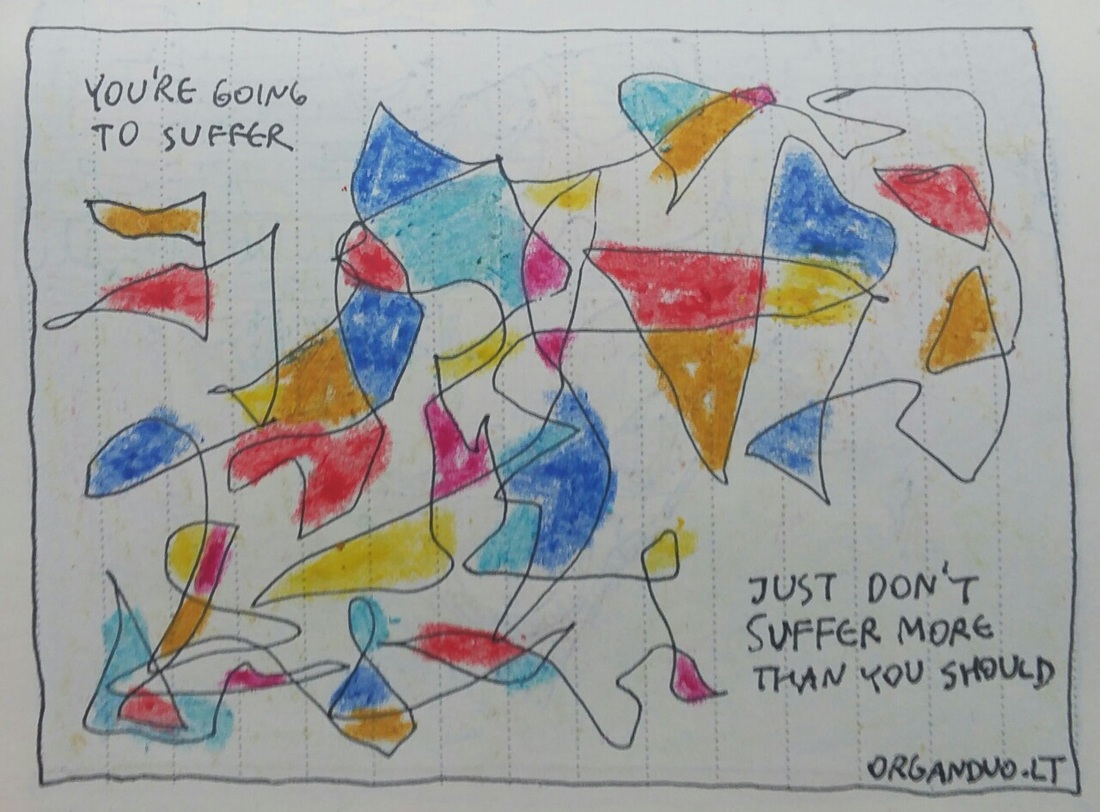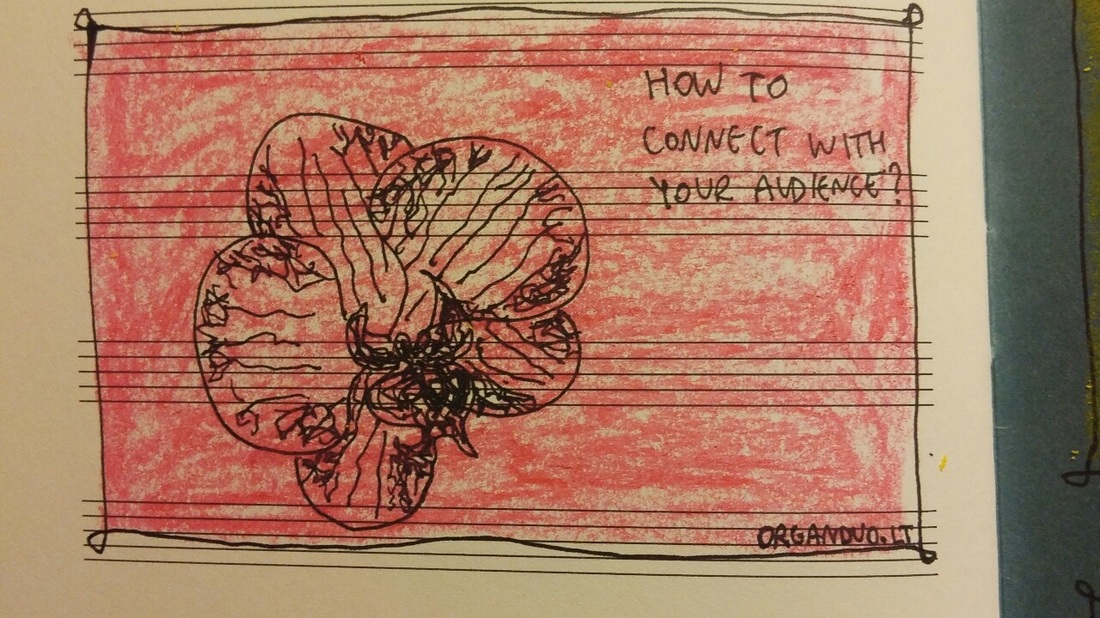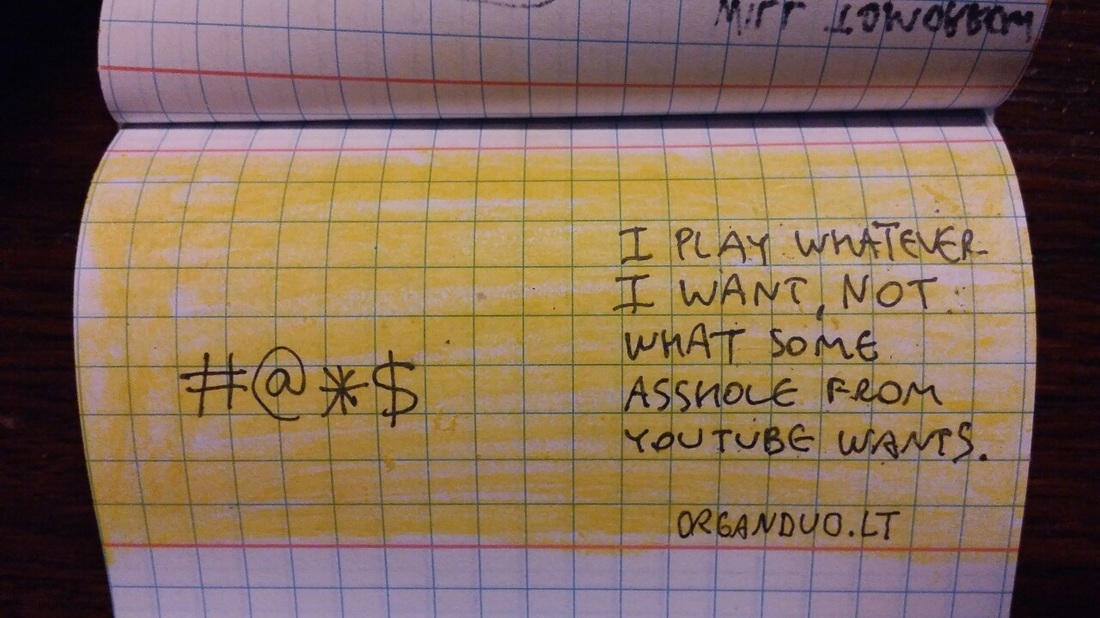|
Vidas: Hi guys, this is Vidas.
Ausra: And Ausra. V: Let’s start episode 254 of Secrets of Organ Playing Podcast. This question was sent by Gene, from http://generoberson.com and Steve from http://organbench.com. They want to know, “how to find people who are interested in your music.” That’s a difficult question, right, Ausra? A: Yes, that’s a very difficult question. V: Imagine, these organists are also composers, and of course, composers need to find organists who would be interested in their music to play,. So, it’s not enough to keep composing and hoping that people will find you, right Ausra? A: Yes, because I think that will never happen if you just compose and let your music live on her own. I think there are so many compositions written for organ nowadays that my best suggestions would be that if you compose music for your own instrument, you need to perform it yourself, first of all. V: That’s absolutely true. If you’re not playing it yourself, why should anyone else play it, right? A: True. V: You mentioned, Ausra, that new organ music composed today is having a difficult time to get noticed, right? What are some of the competitors for the attention of new compositions? A: Actually, old compositions! V: Classical music… A: Classical music, that’s right! V: So, when you are composing your own music, you’re competing with Bach, right? A: True. V: You are competing with Vierne, Franck, Mendelssohn, Messiaen, Langlais… A: and all other great composers. V: ...right. Of course, not everybody who loves Bach would enjoy playing modern music…. Right? ….composed today. And not everybody who enjoys modern music loves playing early music. But still, there is so much competition, and of course there are many many organists who are still composing today. A: That’s right. V: You’re competing with them, too. I also would add that you need to share more, in comparison to other organists. Look how people are creating. Somebody is creating music and then sharing the composition on social media, for example. I think that’s not necessarily the only way. If you are sharing the complete piece, then you are sharing the result. I think your future organists might be interested to see what your compositional process might be. A: That’s a good point, I think. V: What do you think about it, Ausra? A: Yes, I think that’s a very good point. And I would like to ask you, what would force you to learn a new piece by a living composer. What would be your criteria? V: Well, first of all, the piece has to be interesting—substantially high quality, because life is short, music is endless, so you have to choose wisely what to play and what not to play. And, if somebody is composing music, of course, I have to think about my own goals, not only that person’s goals of being noticed. So, a personal connection, of course, helps. When somebody knows me in person, then if they share this piece with me and share the process with me, for example, perhaps then I would become more interested to play it. A: But would you play it if you don’t like it, only because the music is dedicated to you, for example? V: I might play it once. You know? Just to try it out. Not necessarily in public, but as a sight reading, because I have to respect my listeners, too. If I would play low quality organ music, then it defeats the purpose, right Ausra? A: That’s right. So, I hope that people who start to compose organ music don’t have very high expectations that everybody will be playing their music at their earliest convenience, because I think this is not a good reason to start composing organ music. I think you need to compose it if you have that inner feeling that you must compose it. But the result of somebody playing it should not be your goal. That’s what I think. V: And also, Ausra, you have to think about the other thing. If you can not compose, then you should not compose. If you can live without composing, why bother then. Right? A: True. V: If you feel that it’s your destiny, like a calling, then go ahead compose, and actually, it will not matter to you if anyone notices you at first or not. A: That’s right. That’s what I’m thinking about art in general. V: And look at what painters, at what writers...writers usually start writing their novels and other works well before somebody notices them, and writes five, ten, or even twenty years before anyone sees them and decides to read them on a large scale. They might get published earlier than that. And today, you can self-publish your own organ music, too! You can sell your own organ music on your own website, for example, or on the Sheet Music Plus platform. They take a little bit of cut from your revenue, but they also provide some marketing tools, too, but you still have to find your audience, Ausra. A: That’s right, and think about early ages, too. Right now, we only mention a few names, because they were the best of their time, like J. S. Bach, yes. And I don’t think his compositions were so popular when he was alive. I think all his fame came later on. But look at the other composers that surrounded Bach. Almost nobody knows their names. And the same with all the great composers. V: You’re right Ausra, and look at Bach. If you really take his example, then we could behave in the same way, too. For example, when he was working in Leipzig, he kept composing his cantatas for five years in a row. It wasn’t like a published composition, it wasn’t distributed Europe wide to other musicians to perform, to other churches to perform. No, it was just in his circle. And you don’t need to compose cantatas, of course, but if you work in a church, if you are an organist and you keep composing, you could actually keep performing your own music on a weekly basis. A: That’s right, that would be a very good idea, Vidas. And you could share your music every week, and if people would like it, if you would like it, later on maybe you could publish it because I think there are so many editors that would like to publish church music, service music, in the States especially. V: That’s right, and don’t forget to record your own performances, and practices, too. It’s good to share your process, too—how you are learning piece. You could even talk about it, you can write a blog about your compositional process. You can even live cast or live stream videos of yourself composing on the screen. I’ve don’t that in the past. A: Yes, I think, actually, that composing something is easier than to get your piece popular. V: Yes. At first people don’t care at all. Then, they will start to notice you, but they might laugh at you at first. They don’t recognize the value of your composition. But, if you keep persistently composing and sharing your art, then they start noticing… sooner or later. It’s like an avalanche from the mountain. But that’s the trick. You have to go over that dip and persevere for several years, at least. A: That’s right. V: That’s the difficult part. Composing is more or less doable for everyone. But keep producing on a regular basis without being noticed—that’s the tricky part. Not everyone is capable. But I hope people who are listening to this and considering seriously can decide if this what they are born to do. A: That’s right. V: Thank you guys, this was Vidas, A: And Ausra. V: Please send us more of your questions. We love helping you grow. And remember, when you practice, A: miracles happen!
This blog/podcast is supported by Total Organist - the most comprehensive organ training online. It has hundreds of courses, coaching and practice materials for every area of organ playing, thousands of instructional videos and PDF's. You will NOT find more value anywhere else online...
Total Organist helps you to master any piece, perfect your technique, develop your sight-reading skills, and improvise or compose your own music and much much more... Sign up and begin your training today. And of course, you will get the 1st month free too. You can cancel anytime. Check it out here Here's what one of our students is saying: I have so many favorite things about Secrets of Organ Playing. So I’ll do my best to articulate my thoughts. First of all, I hope you will understand that I have spent most of my time accessing the website as much as possible before my month ran out.? The wealth of available material was like shopping for candy!! I am very excited to have fun working with the courses I have download. So, that’s the first thing - the variety and thoroughness of the material available to organists. I took advantage of the variety of Harmony training available. Even though I’ve formally taken harmony, I am looking forward to reinforcing what I learned in the past. This is in preparation for the Improvisation training you offer! I can’t wait to delve into the improv training, something I’ve always dreamed of doing, but haven’t had the means. Here’s more that intrigues and excites me. As a young eager 17 year old, I studied with an Organist who brought me to the music that touched my soul, and I learned to play well, many of the compositions you offer on Total Organist. What excites me is that I have downloaded a number of these compositions to rework my fingering and pedaling achieving the articulate legato that I enjoy hearing and playing. You know, polish the music to achieve the excellence in execution that I desire. Bottom line, so that I don’t just go on and on…I think above all, it is the interesting variety of all things related to becoming a great organist. Truly this is the Total Organist program. Let’s add one more important aspect…the convenience of accessing this material and practicing at my convenience. Of course, this requires discipline to ensure steady progress. Secrets of Organ Playing truly uncovers essential “secrets” of how to become all you can be as an Organist! Heidi Would you like to receive the same or even better results that Heidi is getting? If so, join 80+ other Total Organist students here.
Comments
By Vidas Pinkevicius (get free updates of new posts here)
I could not believe it. She was looking at me with the expression of helplessness in her eyes. It was around 10 am on Friday morning in our church. I was just finishing broadcasting my practice of BWV 548 (we did the same with Ausra's BWV 552 later in the afternoon). Before I even stopped playing, this live broadcast was viewed more than 150 times. That's not a lot, in pop music standards where any video can go viral to millions of people. But to me it was significant. And I wanted to share this experience so that others could apply in their work too. In front of me was this student with her professor ready to have a lesson on our organ. I showed them my laptop with the video replay on Facebook and told how fast the audience is growing from the live video. I explained them that they too could record their practice and/or performance and build their tribe this way. This girl only said, "But I don't have any fans." Of course she doesn't. I didn't have them too when I started this blog back in December of 2011. I started from scratch. The first ten subscribers came on December 5, 7, 8, 9, 14, 15, 15, 17, 18, and 19. At first one a day, then 2, then 3 and so on. With time, generosity, commitment, connection and persistence anyone can do it. But will they? A lot of people will choose to wait until somebody would pick them. Waiting for the phone to ring. If only I had 1000 true fans... I'm sorry but it doesn't work this way anymore. So this student who is just at the start of her organ experience has the same chance to succeed as 10000 other organists. Whom would you call, if you were in charge, if you had to offer recital opportunities? If two people had approximately the same level of skill, training and talent in organ playing, would you pick the one who is waiting and hiding behind her excuses? Or would you choose someone who is constantly putting herself on the line, failing, trying, succeeding and failing again all in front of the eyes of many people whom she's not even met physically? The one who says to herself, "I'm not talented/trained/rich/young/beautiful/insert your excuse/ enough?" Or the one who is showing up day after day, helping, leading and empowering people? Anyway, enough for today, we're off to the church for BACH-322 recital tonight to continue building our tribe. By Vidas Pinkevicius (get free updates of new posts here)
Isn't it frustrating when the organist has to deal with the people who constantly let you down, who use you in an ugly way? They talk to you as if they are masters but in reality are nothing more than couch-quarterbacks or weekend warriors at best. They have no idea what it takes to show up in front of strangers, let yourself be vulnerable and play. Yes, it's painful to deal with those kinds of people. We should run away from them. Even better: connect with people who are better than you. Say to the trouble-makers: "I'm sorry but this is not for you. I'll go talk to these guys instead." [Thanks to Francois] How to connect with your listeners when you play organ in public? Watch this video with insights from me and Ausra. Do you remember an experience from your life when you could or couldn't touch people's hearts with organ sounds? Share your thoughts in the comments. Should you play what you want or what your listeners want? Should you perform what suits you or what you feel your audience might enjoy?
It comes down to who is your listener. If your listener is an anonymous heckler, armchair quarterback, who always knows better (but never does anything that matters), then you've chosen the wrong audience. If, on the other hand, your listener is someone in your shoes, someone you respect and trust, then by all means pay attention to what he or she has to say. Ultimately, the decision is yours and yours alone because actually nobody is in your shoes but you. ...is a losing battle for organists. There always be more people who like entertainment and not intellectually, emotionally, and spiritually deep music.
What if instead of trying to convert people who are opposed to organ, you would go to the people who care deeply about it? There are various groups within each congregation and there are certainly a few people who want to hear what you have to offer them. Here's the thing: it's better to obsess and focus on these few people on the edges, your true fans than to keep trying to push that rock uphill. No matter how hard you try, no matter how well you play, no matter what kind of music you play, they will be busy ignoring you as usual. The flip side of this is interesting: the more value you provide to your true fans, to the insiders, the more grateful they will feel and maybe (just maybe) they will start spreading the word for you because you have figured out how to take their best dreams and lead them where they wanted to go in the first place. Sometimes you have to be brave enough to say "it's not for you but that's OK." |
DON'T MISS A THING! FREE UPDATES BY EMAIL.Thank you!You have successfully joined our subscriber list.  Photo by Edgaras Kurauskas Photo by Edgaras Kurauskas
Authors
Drs. Vidas Pinkevicius and Ausra Motuzaite-Pinkeviciene Organists of Vilnius University , creators of Secrets of Organ Playing. Our Hauptwerk Setup:
Categories
All
Archives
July 2024
|
This site participates in the Amazon, Thomann and other affiliate programs, the proceeds of which keep it free for anyone to read.
Copyright © 2011-2024 by Vidas Pinkevicius and Ausra Motuzaite-Pinkeviciene.
Terms of Service and Privacy Policy
Copyright © 2011-2024 by Vidas Pinkevicius and Ausra Motuzaite-Pinkeviciene.
Terms of Service and Privacy Policy







 RSS Feed
RSS Feed